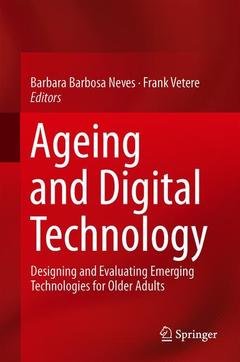Ageing and Digital Technology, 1st ed. 2019 Designing and Evaluating Emerging Technologies for Older Adults

Date de parution : 01-2019
Ouvrage de 335 p.
15.5x23.5 cm
Thèmes d’Ageing and Digital Technology :
Mots-clés :
Technology and ageing; Digital technology and seniors; Digital technology and elderly; Information technologies and seniors; Communication technologies and seniors; Information technologies and elderly; Communication technologies and elderly; Technology design for seniors; Technology and social gerontology; Older adults and virtual social environments; Multidisciplinary approaches to ageing and technology; Theoretical perspectives on ageing and technology; Research methods for ageing and technology; Emerging technologies for seniors; Ageing and social participation; Technology and elderly autonomy; Technology design for elderly; Computer science and the elderly; Digital technology and social change; Assistive technologies
